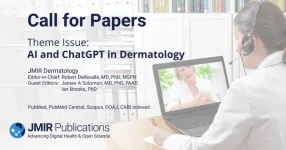(Press-News.org) Exciting a brain region using electrical noise stimulation can help improve mathematical learning in those who struggle with the subject, according to a new study from the Universities of Surrey and Oxford, Loughborough University, and Radboud University in The Netherlands.
During this unique study, researchers investigated the impact of neurostimulation on learning. Despite the growing interest in this non-invasive technique, little is known about the neurophysiological changes induced and the effect it has on learning.
Researchers found that electrical noise stimulation over the frontal part of the brain improved the mathematical ability of people whose brain was less excited (by mathematics) before the application of stimulation. No improvement in mathematical scores was identified in those who had a high level of brain excitation during the initial assessment or in the placebo groups. Researchers believe that electrical noise stimulation acts on the sodium channels in the brain, interfering with the cell membrane of the neurons, which increases cortical excitability.
Professor Roi Cohen Kadosh, Professor of Cognitive Neuroscience and Head of the School of Psychology at the University of Surrey who led this project, said:
“Learning is key to everything we do in life – from developing new skills, such as driving a car, to learning how to code. Our brains are constantly absorbing and acquiring new knowledge.
“Previously, we have shown that a person’s ability to learn is associated with neuronal excitation in their brains. What we wanted to discover in this case is if our novel stimulation protocol could boost, in other words excite, this activity and improve mathematical skills.”
For the study, 102 participants were recruited, and their mathematical skills were assessed through a series of multiplication problems. Participants were then split into four groups: a learning group exposed to high-frequency random electrical noise stimulation, an overlearning group in which participants practised the multiplication beyond the point of mastery with high-frequency random electrical noise stimulation. The remaining two groups, consisted of a learning and overlearning group but they were exposed to a sham (i.e., placebo) condition, an experience akin to real stimulation without applying significant electrical currents. EEG recordings were taken at the beginning and at the end of the stimulation to measure brain activity.
Dr Nienke van Bueren from Radboud University, who led this work under Professor Cohen Kadosh's supervision, said:
“These findings highlight that individuals with lower brain excitability may be more receptive to noise stimulation, leading to enhanced learning outcomes, while those with high brain excitability might not experience the same benefits in their mathematical abilities.”
Professor Cohen Kadosh adds:
“What we have found is how this promising neurostimulation works and under which conditions the stimulation protocol is most effective. This discovery could not only pave the way for a more tailored approach in a person’s learning journey but also shed light on the optimal timing and duration of its application.”
This study was published in PL0S Biology
Notes to editors
Professor Roi Cohen Kadosh is available for interview.
For further information, please email mediarelations@surrey.ac.uk
END
Exciting the brain could be key to boosting maths learning, says new study
2023-08-31
ELSE PRESS RELEASES FROM THIS DATE:
How does “MAD” accretion form around a black hole?
2023-08-31
An international scientific team has revealed for the first time the magnetic field transport processes in the accretion flow of a black hole and the formation of a "MAD"—a magnetically arrested disk—in the vicinity of a black hole.
The researchers made the discovery while conducting multi-wavelength observational studies of an outburst event of the black hole X-ray binary MAXI J1820+070, using Insight-HXMT, China's first X-ray astronomical satellite, as well as multiple telescopes.
Key to their discovery was the observation that the radio emission from the black hole jet and the optical emission from the outer ...
Mutation rates in whales are much higher than previously reported
2023-08-31
An international team of marine scientists, led by the University of Groningen in the Netherlands and the Center for Coastal Studies in the USA, has studied the DNA of family groups from four different whale species to estimate their mutation rates. The results revealed much higher mutation rates than previously thought, and which are similar to those of smaller mammals such as humans, apes, and dolphins. Using the newly determined rates, the group found that the number of humpback whales in the North Atlantic before whaling was 86 percent lower than earlier studies suggested. The study is the first proof that this method can be used to estimate mutation rates ...
Peering into nanofluidic mysteries one photon at a time
2023-08-31
Researchers at University of Manchester and the École polytechnique fédérale de Lausanne (EPFL), Switzerland, have revealed an innovative approach to track individual molecule dynamics within nanofluidic structures, illuminating their response to molecules in ways never before possible.
Nanofluidics, the study of fluids confined within ultra-small spaces, offers insights into the behaviour of liquids on a nanometer scale. However, exploring the movement of individual molecules in such confined environments has been challenging due to the limitations of conventional microscopy techniques. This obstacle prevented ...
Study demonstrates adding complex component of milk to infant formula confers long-term cognitive benefits
2023-08-31
LAWRENCE, KANSAS — Breast milk is widely acknowledged as the most beneficial nutrition for infants, but many families face medical or logistical challenges in breastfeeding. In the U.S., just 45% of infants continue to be exclusively breastfed at 3 months of age, according to the Centers for Disease Control.
For decades, researchers have sought to create a viable complement or alternative to breast milk to give children their best start for healthy development. New research out of the University of Kansas has shown how a complex component of milk that can be added to infant ...
Do artificial roosts help bats? Illinois experts say more research needed
2023-08-31
URBANA, Ill. — Artificial roosts for bats come in many forms — bat boxes, condos, bark mimics, clay roosts, and cinder block structures, to name a few — but a new conservation practice and policy article from researchers at the University of Illinois Urbana-Champaign suggests the structures haven’t been studied rigorously enough and may harm bats in some scenarios. The article, published in Conservation Biology, lays out potential dangers and encourages more research on the popular conservation practice.
“The major emphasis among conservation managers using artificial roosts is how to attract ...
JMIR Dermatology call for papers theme issue on AI and ChatGPT in dermatology
2023-08-31
JMIR Dermatology Editor-in-Chief: Robert Dellavalle, MD, PhD, MSPH and guest editors James A Solomon, MD, PhD, FAAD and Ian Brooks, PhD welcome submissions to a special theme issue examining "Artificial Intelligence (AI) and ChatGPT in Dermatology."
JMIR Dermatology welcomes all topics related to diseases of the skin, hair, and nails, with a wide breadth and depth of papers focusing on AI applications. All topics at the intersection of dermatology, AI, and ChatGPT are eligible for this theme issue.
The journal ...
An ‘introspective’ AI finds diversity improves performance
2023-08-31
An artificial intelligence with the ability to look inward and fine tune its own neural network performs better when it chooses diversity over lack of diversity, a new study finds. The resulting diverse neural networks were particularly effective at solving complex tasks.
“We created a test system with a non-human intelligence, an artificial intelligence (AI), to see if the AI would choose diversity over the lack of diversity and if its choice would improve the performance of the AI,” says William Ditto, professor of physics at North Carolina State University, director ...
Penn State professor to lead field campaign to study climate in Baltimore area
2023-08-31
UNIVERSITY PARK, Pa. — Kenneth Davis, professor of atmospheric and climate science at Penn State, will lead a team of 23 investigators from 13 research institutions in a new field campaign supported by the U.S. Department of Energy (DOE) to study surface-atmosphere interactions around Baltimore, Maryland, to see how they influence the city’s climate. The new campaign, called the Coast-Urban-Rural Atmospheric Gradient Experiment (CoURAGE), is expected to start in October 2024 and run through September 2025.
CoURAGE will contribute to the Baltimore Social-Environmental ...
Covid pandemic may have changed the gut bacteria of infants, research finds
2023-08-31
Infants who spent most of their first year in the pandemic have fewer types of bacteria in their gut than infants born earlier, according to a team of developmental psychology researchers.
The findings, published in Scientific Reports, showed that infants whose gut microbes were sampled during the pandemic had lower alpha diversity of the gut microbiome, meaning that there were fewer species of bacteria in the gut. The infants had a lower abundance of Pasteurellaceae and Haemophilus—bacteria that live within humans and can cause various infections—and significantly different beta diversity, which tells us how similar or dissimilar the gut microbiome for ...
New blood test gives very high accuracy to screen for Alzheimer’s disease
2023-08-31
A new blood test called p-tau217 shows promise as an Alzheimer's disease biomarker, and when used in a two-step workflow very high accuracy to either identify or exclude brain amyloidosis, the most important and earliest pathology. That is an innovation now presented by researchers at the University of Gothenburg, together with colleagues at University of Lund and in Montreal, Canada.
In recent years, a lot of effort has been put on developing biomarkers in blood that could potentially help to identify Alzheimer’s disease (AD). Tau protein, ...




